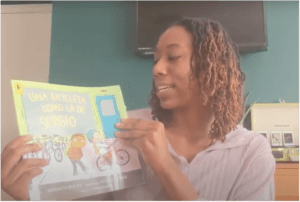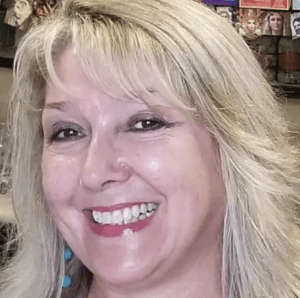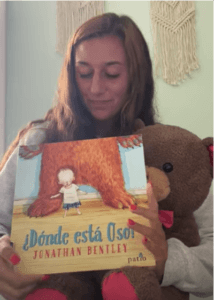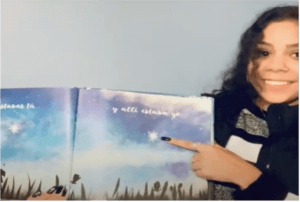Co-authored by Emily O’Sullivan and Madison Hanrahan
Throughout the Fall 2020 semester, students in Dr. Alison Maginn’s FS300A Advanced Spanish Conversation and Oral Discourse course collaborated with the Long Branch Free Public Library on a co-creative, reciprocal service-learning storytelling project that adapted to pandemic-related restrictions and fostered lasting connections among all parties involved. Though students enrolled in Dr. Maginn’s course during previous semesters participated in an intercultural mentoring program based within the library’s facilities, COVID-19 forced the latter to close its doors to the public in March. Accordingly, Dr. Maginn consulted with the Children’s Librarian, Nekesha Marshall, to devise an alternative service-learning structure that would best assist Long Branch in the wake of the COVID-19 crisis.
 Ultimately, Marshall identified a need for virtual storytelling content that would provide Spanish-speaking children with educational resources during the library’s closure. Given the growing immigrant populations within Long Branch and in nearby towns, many families increasingly rely on such resources to help their children successfully navigate school systems in which the language of instruction differs from their primary languages spoken at home. With this in mind, Marshall suggested that each Monmouth student select a children’s book written in Spanish from the library’s collection so that they could practice reading and performing the story. After working on their oral presentations throughout the semester, students would then record themselves reading the stories and upload these videos to the library’s webpage and YouTube account for local children and their families to view remotely.
Ultimately, Marshall identified a need for virtual storytelling content that would provide Spanish-speaking children with educational resources during the library’s closure. Given the growing immigrant populations within Long Branch and in nearby towns, many families increasingly rely on such resources to help their children successfully navigate school systems in which the language of instruction differs from their primary languages spoken at home. With this in mind, Marshall suggested that each Monmouth student select a children’s book written in Spanish from the library’s collection so that they could practice reading and performing the story. After working on their oral presentations throughout the semester, students would then record themselves reading the stories and upload these videos to the library’s webpage and YouTube account for local children and their families to view remotely.
 Notably, this exercise entailed immense benefits for the project’s student participants, challenging them to refine their oral communication skills for a purpose greater than themselves. As Dr. Maginn explained, “Storytelling is quite a task, even in your own language. You have to really practice enunciating clearly and delivering a bit of dramatization so that the story is accessible for little kids.” Moreover, the project demonstrated how foreign language instruction functions as a critical component of promoting global understanding. In Dr. Maginn’s words, “Language is never just language: language is language and culture. So, when students study language at Monmouth, they are always studying a language in context, and one of the big things we emphasize in language instruction is that there are both similarities and differences amongst cultures that we should embrace rather than be afraid of… Whether it be through readings, videos, or live discussions with native speakers, we encourage students to engage in critical thinking and to move beyond initial gut reactions, and language allows us to do this so well because it necessitates that one try to understand things that may be different from what they’re used to.”
Notably, this exercise entailed immense benefits for the project’s student participants, challenging them to refine their oral communication skills for a purpose greater than themselves. As Dr. Maginn explained, “Storytelling is quite a task, even in your own language. You have to really practice enunciating clearly and delivering a bit of dramatization so that the story is accessible for little kids.” Moreover, the project demonstrated how foreign language instruction functions as a critical component of promoting global understanding. In Dr. Maginn’s words, “Language is never just language: language is language and culture. So, when students study language at Monmouth, they are always studying a language in context, and one of the big things we emphasize in language instruction is that there are both similarities and differences amongst cultures that we should embrace rather than be afraid of… Whether it be through readings, videos, or live discussions with native speakers, we encourage students to engage in critical thinking and to move beyond initial gut reactions, and language allows us to do this so well because it necessitates that one try to understand things that may be different from what they’re used to.”
When asked about the project’s relevance to the IGU’s core value of cross-cultural awareness, she continued, “Even though [with this project] we were only a few miles away from the library, we definitely crossed borders because our students were working with a community that most of them did not know much about. Many of our students had never previously worked with recent immigrant families, so there was a great opportunity for them to open up a conversation and dialogue. Then, in class, we supported this learning experience with readings about social issues for immigrants in the United States, always making sure to back up the service learning with meaningful context.”
 Despite Monmouth students’ inability to meet the children for whom they read, their participation in the project greatly enhanced both their Spanish-speaking skills and connection to Monmouth’s surrounding communities. When recalling her experiences while completing the project, freshman Isabella Leak detailed, “Every day, I would go through my story and practice enunciating all of the words to make sure that I would be able to speak clearly for the kids on the video… Just by reading the book, practicing the vocabulary, and making sure my accent was good, my Spanish improved… but I also developed a greater understanding of how Spanish connects us to our community and to other people.” Though facilitating such connection during a pandemic may seem daunting, the service-learning experience proved a remarkable success, with Leak concluding that, “This project definitely opened my eyes and made me realize how lucky people who speak English as their first language are, and I think we overlook that privilege and do not really acknowledge it. However, it’s really important for us as students to understand that point… being able to teach [Spanish] and connect to other people was my biggest takeaway; I really learned the value of language and connection with other people.”
Despite Monmouth students’ inability to meet the children for whom they read, their participation in the project greatly enhanced both their Spanish-speaking skills and connection to Monmouth’s surrounding communities. When recalling her experiences while completing the project, freshman Isabella Leak detailed, “Every day, I would go through my story and practice enunciating all of the words to make sure that I would be able to speak clearly for the kids on the video… Just by reading the book, practicing the vocabulary, and making sure my accent was good, my Spanish improved… but I also developed a greater understanding of how Spanish connects us to our community and to other people.” Though facilitating such connection during a pandemic may seem daunting, the service-learning experience proved a remarkable success, with Leak concluding that, “This project definitely opened my eyes and made me realize how lucky people who speak English as their first language are, and I think we overlook that privilege and do not really acknowledge it. However, it’s really important for us as students to understand that point… being able to teach [Spanish] and connect to other people was my biggest takeaway; I really learned the value of language and connection with other people.”
 In short, Dr. Maginn’s course allowed Monmouth University students to practically apply their Spanish language skills while promoting awareness and understanding of Spanish-speaking communities in and around West Long Branch. Ultimately, its model of community-driven work could be a steppingstone toward a substantive addition to Monmouth University. The project reinforced her students’ language skills, all while granting them new experiences that helped them grow as people and empowering the communities around them. Following this lead, service-learning practitioners should seriously consider adopting similar approaches and understand that rich cross-cultural connections are possible and transpiring daily, even in the midst of a pandemic.
In short, Dr. Maginn’s course allowed Monmouth University students to practically apply their Spanish language skills while promoting awareness and understanding of Spanish-speaking communities in and around West Long Branch. Ultimately, its model of community-driven work could be a steppingstone toward a substantive addition to Monmouth University. The project reinforced her students’ language skills, all while granting them new experiences that helped them grow as people and empowering the communities around them. Following this lead, service-learning practitioners should seriously consider adopting similar approaches and understand that rich cross-cultural connections are possible and transpiring daily, even in the midst of a pandemic.
To access Monmouth University students’ finished products, please visit the Long Branch Free Public Library website or the library’s YouTube account.
